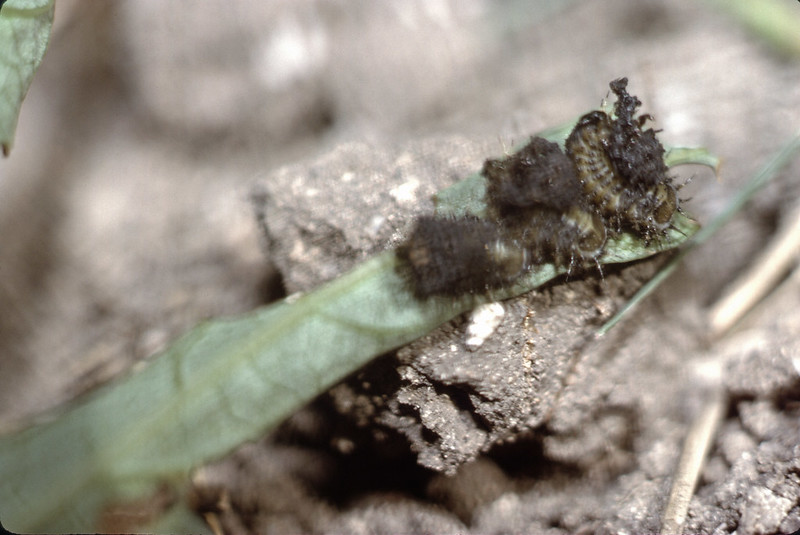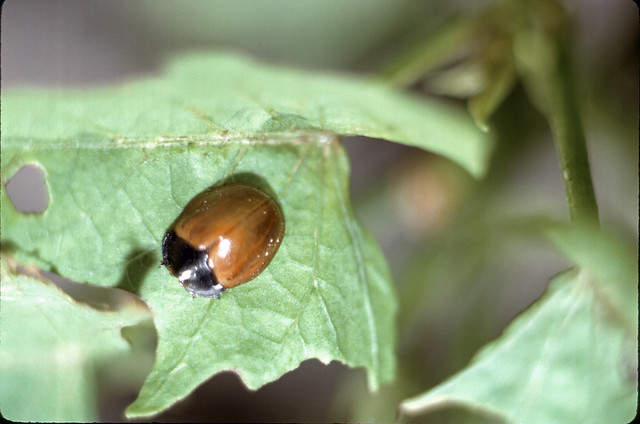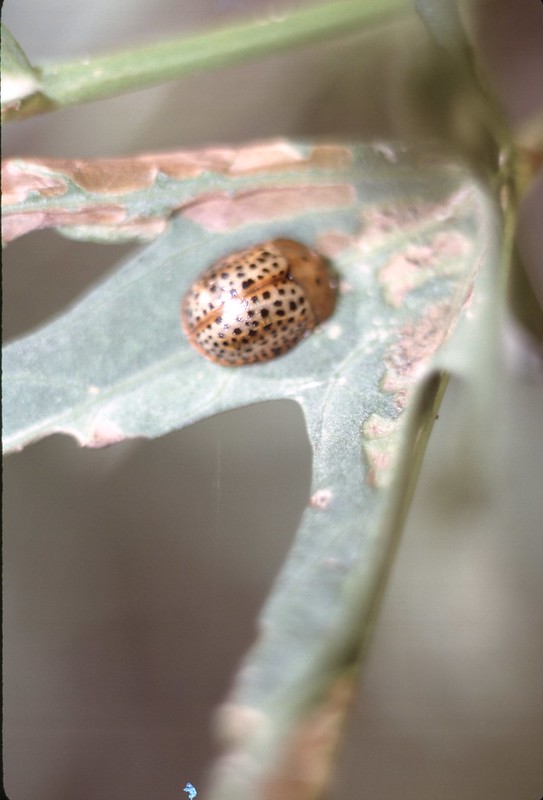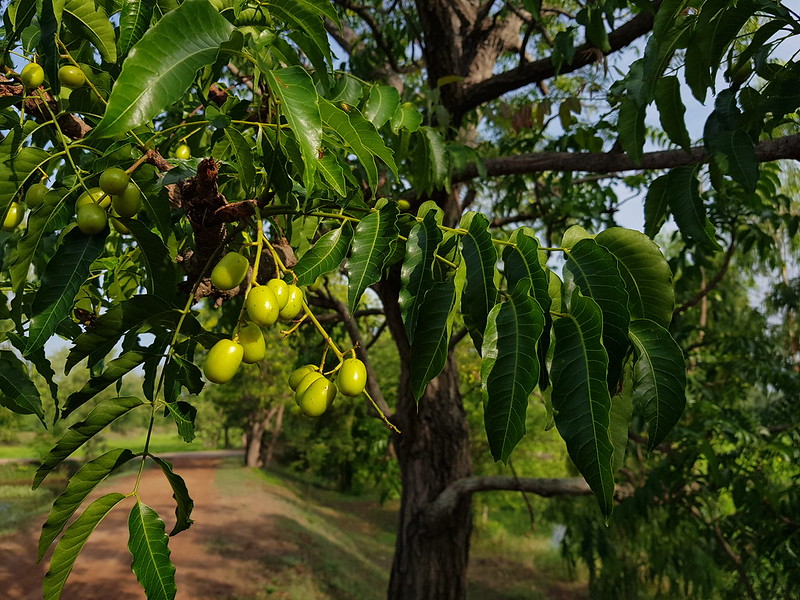See first blog here.
One day some people came to our house in Letan, Haiti. They were from a village a couple of miles away and they told me that there was some insect pest devouring their sweet potatoes—which is the main crop they grow in the soils of that area. They asked if I would come look at it. So I walked there with Enoch, one of my friends (there were no roads in that area) to investigate.
When we got there, we noticed that the plants were covered with reddish beetles and what appeared to be their larvae. I didn't recognize them, so I collected some to bring home and study a bit. I didn't see any reference to them in any of the books I had, so I put some specimens in alcohol to send to an entomologist at the University of Florida to see if they could help, but they didn't recognize them either. Meanwhile, I was raising these things at home to observe their life cycle. I did eventually find a reference to these insects in a 40-year old entomology text, which recommended spraying DDT to get rid of them. (That seemed to be the standard solution for all insect pest problems in the text.)
 |
| Sweet Potato Tortoise Beetle Larvae Carrying Excrement on Their Backs |
 |
| Sweet Potato Tortoise Beetle Adult |
One of the reasons this beetle was so destructive had to do with the way that sweet potatoes are grown. When a crop is harvested, some of the vines are kept for their next crop. They would stick cuttings in the ground and they would take root to grow the next crop. However, if the vines they planted had these insects on them, they would finish eating the leaves before the plant had a chance to make roots.
 |
| Sweet Potato Tortoise Beetle Nymph |
Since I was unable to find solutions from anyone else, I was trying to figure out something myself. We had in our area a non-native but extensively planted tree called neem. The seeds contained a chemical which was effective at killing larvae of many species of beetles and caterpillars. I ground some seeds and put them in water and found that if I dipped the tops in the solution before planting, it would kill enough of the larvae to keep them from doing economic damage. If a crop was already in the ground, some of the neem solution could be strained and then put in a sprayer to apply to the plants. It would kill enough of the insects in order to spare the crop.
 |
| Neem Tree Fruit |
Armed with this information, Enoch and I made another visit to the area to talk to some of the sweet potato farmers. We explained to them some of the things we had discovered and some of the possible solutions we had. We told them we could provide neem seeds for them and could lend them a sprayer of they wanted to use one. After explaining this to a few farmers who had gathered they asked, "so when are you going to come do that for us?"
Apparently these farmers wanted to save their crop, but not badly enough so as to extend any effort to do so. The challenge in the area where were working was that we were to close to the capital city. (It was only about 20 miles away, but it could take over an hour to drive there in rainy season.) In the capital city were lots of organizations that were giving away food, clothes and medicine. It was a lot easier to go get this free food than to try to plant and care for a sweet potato crop in order to get a good harvest.
Towards the end of our time in Haiti, I came to the realization that we were the problem. By "we" I mean typically well-meaning organizations with good intentions, who just wanted to help out people who were suffering. (There were also plenty of organizations happy to use pictures of suffering people in order to raise money to enrich themselves.) But in the process, we had destroyed their dignity, damaged their livelihoods and diminished their desire to work to help themselves. Haiti was receiving enormous amounts of aid from other countries either from foreign governments or non-governmental organizations (NGOs), yet it continued to remain the poorest country in the western hemisphere. Somehow, the math didn't seem to add up.
I don't want to sound heartless, but I came to the conclusion that the best thing for the country would be for all the NGOs to pull out. It would be hard at first, because we had created such a dependency on foreign handouts. But eventually, I believe that the Haitian people would figure out a solution.
I realize that the perpetual poverty of Haiti has no simple solution. And I also believe there is a spiritual element to this situation that cannot be solved with money. However, seeing what was going on caused me—and still causes me—to ask myself, "Is there anything I am doing that is creating unnecessary long-term dependencies?" I say unnecessary because there will always be those who are unable to help themselves and I believe that we should contributing to help such people in one way or another. Throughout the Bible we see God's call for us to be generous with those in need.
While he was out telling people the good news of new life in Jesus, the apostle Paul was also doing some fundraising for the believers in Jerusalem who we suffering because of both famine and prejudice against Jesus-followers. In preparing the church in Corinth for this prior to his visit to them he wrote:
The point is this: whoever sows sparingly will also reap sparingly, and whoever sows bountifully will also reap bountifully. Each one must give as he has decided in his heart, not reluctantly or under compulsion, for God loves a cheerful giver. And God is able to make all grace abound to you, so that having all sufficiency in all things at all times, you may abound in every good work. As it is written,
“He has distributed freely, he has given to the poor;
his righteousness endures forever.” (2 Corinthians 9:6-9 ESV)
In short, we have a generous God, so we also should be generous. If God blesses us from His resources (i.e. the earth and the things it produces), then we should bless others from the things with which He has blessed us. The things we have are not ours to be hoarded but are God's to be shared. But God does not just bless us with money, He may bless us with power. When we give in a way that creates dependency, we are sharing our material wealth, but not our power. Poverty comes not just from a lack of material resources, but also from a lack of power to do something about one's situation.
One of the ways to share power is through education. One of the things I especially liked about the Baptist Haiti Mission, the organization we worked with in Haiti, was their emphasis on education and schools. Enoch, whom I mentioned above, had several children who went to our mission's school in the area. After we left, one of them received further assistance in his studies and went on to become a doctor so he could help his people. That's just one example of how education can be a life-changer not just for the person educated, but also for the people impacted by them.
In the summer of 1992, one of the masons who worked at our organization's office in Fermathe, Haiti, wanted to talk to me. He had heard that I knew how to fix up water springs, and there was one in his area that needed some work. At the time I was having health issues (which I realized many years later was burnout), so I really had little physical strength to do anything, but I went with him to the spring and explained the things he could do to fix it up so that their drinking water source would be more reliable. I probably spent half a day with him and that was the last I heard of it for a while. In the meantime, we went back to North America on vacation during which I spent most of my days sleeping. We went back to Haiti, feeling strengthened and refreshed. Several months later, I ran into the mason who had showed me the spring. He was overflowing with thankfulness for me helping him fix up the spring. I asked him why he was so exuberant in thanking me because I really hadn't done anything. In fact, I felt like I had abandoned them. He said he was so thankful because I showed him how they could do the project themselves. He said that most people who knew something like what I taught them would keep it as a trade secret so they alone could profit from their knowledge. But that when I shared a trade technique with him, that gave him power to help solve a problem not just for his own benefit, but for the benefit of the community.
Instead of dependency, empowerment.
I would rather be wanted as a friend than needed as someone who another is dependent on. When I help empower someone, they may not need me anymore, but they can still be my friend.
When we were working in Haiti, a lot of people would come to us because they wanted a job. They didn't necessarily want to work, but they wanted a paycheck. And giving someone a job was a way to help people while still respecting their dignity. Because I liked working with Enoch, I offered him a job to help him financially, even though he was a leader in a church of another denomination than the one we worked for. After several months, he quit. He said, "I'd rather be your friend than your employee." That statement has stuck with me all these years. Being someone's friend doesn't necessarily take money. But it does require investment in the relationship though spending time together, helping each other, and listening to each other.
My present work involves helping start churches in Thailand. As I go about this task, I'm always thinking about how to best carry out our mission in such a way that any church that results can be run on a sustainable, long-term basis using local resources. I don't want to saddle them with something that they won't be able to maintain. Not everyone has the same background we do, where we have seen such negative effects of unnecessary dependencies, so we think differently about these things than many of our co-workers. Occasionally, there has been conflict. But we're happy now to be working with a Thai leader who has a similar vision to ours. And I hate seeing her stressed out when she has to try to deal with a mess someone else left behind who didn't share these values.
Eventually, we hope to be able to leave Thailand because we are no longer needed, while at the same time having many friends who wouldn't mind if we stayed.

No comments:
Post a Comment